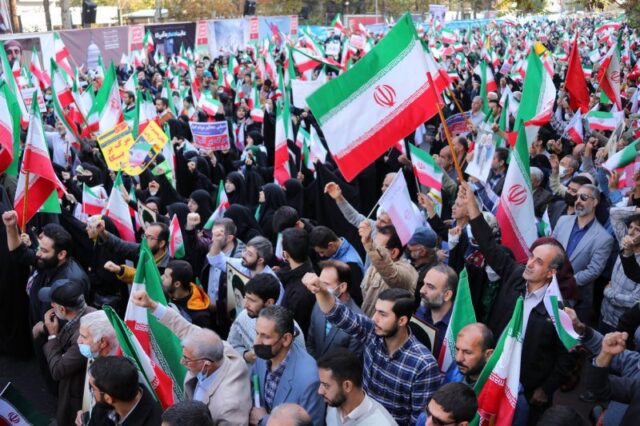Nov. 14 (UPI) — An Iranian court on Monday sentenced a protester to death on charges of “enmity against God” after weeks of demonstrations following the death of Mahsa Amini.
The website for Iran’s judiciary said in a statement that the unidentified protester was sentenced to death after they were accused of setting fire to a government center.
Five other defendants were sentenced to 5 to 10 years in prison on allegations they colluded to commit crimes against national security and the disruption of public order and peace, according to the court in Tehran.
Norway-based nonprofit group Iran Human Rights said that at least 20 protesters are currently facing charges punishable by death, including a protester facing sentencing for murder charges.
That man, identified as Mohammad Ghobadlu, has reportedly likely been transferred to solitary confinement at Rajai Shahr Prison without access to his family or a lawyer.
At least 326 people — including 43 children and 25 women — have been killed during the protests and 14,000 have been arrested since the protests began, according to data from Iran Human Rights and the United Nations.
The situation in Iran has been watched by independent analysts and war bloggers, including the Institute for the Study of War — a think tank based in Washington, D.C.
The think tank said in a daily analysis Sunday that at least 12 protests took place in seven cities across Iran on Sunday, including Tehran where they shouted, “death to the dictator.”
Iran Human Rights director Mahmood Amiry-Moghaddam said in a statement that the international community “must strongly warn the Islamic Republic of the consequences of executing protesters.”
“Summoning their ambassadors and implementing stronger effective human rights action against state officials are amongst the consequences European countries must consider.”
Britain and the European Union announced sanctions against Iran on Monday after the court reached its decision, designating at least 24 officials in Iran.
Britain’s Foreign, Commonwealth & Development Office said in a statement that Iranian authorities have “responded to the protests with violence, reportedly killing hundreds and injuring thousands of others.”
Those sanctioned by Britain include Iran’s Communications Minister Issa Zarepour and Vahid Mohammad Naser Majid, chief of Iran’s Cyber Police.
“These sanctions target officials within the Iranian regime who are responsible for heinous human rights violations,” Britain’s Foreign Secretary James Cleverly said in a statement.
“Together with our partners, we have sent a clear message to the Iranian regime — the violent crackdown on protests must stop and freedom of expression must be respected.”
Others sanctioned include nearly two dozen law enforcement officers and security officials across the country.
“The EU strongly condemns the unacceptable violent crackdown of protesters,” Josep Borrell, the EU’s top diplomat, said in a statement.
“We stand with the Iranian people and support their right to protest peacefully and voice their demands and views freely. We are today imposing additional sanctions on those responsible for the suppression of the Iranian protestors.”
The EU sanctioned a total of 29 individuals and three entities, including four members of the squad that arbitrarily arrested Mahsa Amini for violating the country’s strict dress code for women.
Others sanctioned by the EU included the heads of the Iranian Law Enforcement Forces and of the Islamic Revolutionary Guards Corps, as well as Brigadier General Kiyumars Heidari, the commander of the Iranian Army’s Ground Force.
The EU sanctions include an asset freeze and travel ban, as well as a prohibition on EU citizens and companies providing them with funds. Europe has now sanctioned 126 people and 11 entities in Iran.

COMMENTS
Please let us know if you're having issues with commenting.